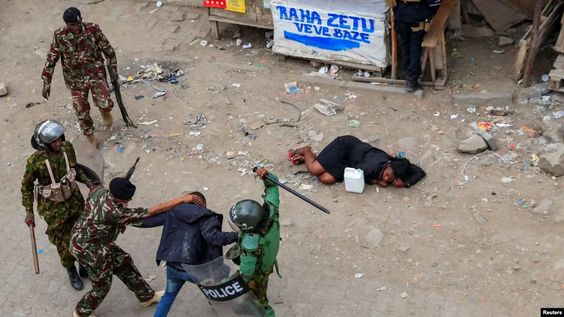Africa
Despite abuse warnings, the US supports sending Kenyan police to Haiti

The U.S. government explicitly warned Kenyan police forces against violent mistreatment while considering Kenya to be the commander of a multinational force in Haiti. To combat gang conflict, 1,000 of those cops may now travel to Haiti.
It’s a difficult turn for a police force that has long been charged by human rights organisations with murder and torture, including shooting dead civilians during Kenya’s COVID-19 curfew. In July, amid rallies the opposition called over growing living costs, police fatally shot around 30 individuals, all in Kenya’s poorest neighbourhoods, according to a local group.
In a joint statement with 11 other countries in mid-July, the United States said: “We are saddened by the loss of life and concerned by high levels of violence, including the use of live rounds,” during the rallies.
Now, the United States is getting ready to present a resolution to the U.N. Security Council authorising a mission in Haiti led by Kenyan police, who are present in such great numbers but have little abroad experience and do not speak French, the language used in Haiti.
The United States ambassador to the United Nations, Linda Thomas-Greenfield, stated on Tuesday that “this is not a traditional peacekeeping force.”
The United Nations had been pleading for more than nine months for a nation to take the helm of an initiative to bring peace to the most impoverished country in the Western Hemisphere.
Kenya’s involvement was made known on Saturday when its foreign minister stated that his country has “accepted to positively consider” deploying a force to Haiti and 1,000 police officers to help “restore normalcy,” train the Haitian National Police, and guard vital assets.
Alfred Mutua stated that “Kenya stands with people of African descent throughout the world.” When questioned about the force or what Kenya would get in return, a ministry spokeswoman remained silent.
In a sign of the difficulty in gathering international soldiers for Haiti, where lethal gang violence has risen since the death of President Jovenel Moise in 2021, U.S. Secretary of State Antony Blinken on Tuesday hailed Kenya for only considering the mission.
Some groups that have long monitored allegations of police wrongdoing in Kenya are concerned.
Otsieno Namwaya, a Kenya researcher for Human Rights Watch, told the Associated Press, “We had some consultations with Kenyan [civil society organisations] last week and there was general consensus that Kenya should not be seen to be exporting its abusive police to other parts of the world.”
Kenya’s security forces have been in neighbouring Somalia for years to combat Islamic extremists, a deadly menace that some Kenyans argue should keep police at home. Since last year, troops have also been stationed in the unrest-ridden eastern Congo. On previous U.N. peacekeeping missions, notably one in Sierra Leone, Kenyans participated.
Kenya has fewer than 450 personnel serving in U.N. peacekeeping missions, in contrast to other African countries like Rwanda, Ghana, and Egypt, who each have thousands of personnel. Police policemen number just 32. A total of 35 Americans are participating in U.N. peacekeeping assignments.
According to the Independent Medical-Legal Unit’s executive director, Peter Kiama, “I have no knowledge of any complaints raised by the U.N. during those deployments, hence no concern on my end.” “Remember, the major challenges regarding policing practises in Kenya include political interference with police command and independence, inadequate political will to reform the institution, [a] culture of internal impunity and criminality, and inadequate internal and external accountability,” the report stated.
As opposed to previous peacekeeping missions, where a U.N. troop commander would be in charge, the Haiti deployment would likely put Kenyan police in charge.
Tuesday, Haitian Prime Minister Ariel Henry claimed he had a conversation with Kenyan President William Ruto to express gratitude for Kenyans’ “demonstration of fraternal solidarity.” In the upcoming weeks, Kenya intends to dispatch a task group to determine the operational needs of the mission.
Benice Pierre, a resident of Port-au-Prince, stated on Wednesday, “We have to find someone who can help us.”
The U.S., the European Union, and other allies have recently invested millions of dollars in Kenya’s police force in the form of training and support, with Washington emphasising “promoting police accountability and professionalism.”
However, there was a heated discussion about police conduct during the most recent protests in Kenya’s National Assembly last week. There were also calls for a moment of silence.
According to minority leader Opiyo Wandayi, the level of brutality shown to defenceless, unarmed individuals over the past few months has been unprecedented. Jobs, not bullets, are what the young people you are killing need.
Threats to gather information to present to the International Criminal Court have been made by Kenya’s main opposition party.
Interior Minister Kithure Kindiki responded by claiming that police had remained “neutral, impartial, and professional.” The police have not responded to inquiries the ministry forwarded to them regarding alleged abuses.
Ruto, who was elected president a year ago, first applauded police for their behaviour during the protests but later issued a warning to officers about extrajudicial executions as a result of growing public uproar.
Kenya’s police force has long been known to have issues, even among officials.
The National Police Service “does not have a’shoot to kill’ policy,” according to Hillary Mutyambai, inspector general, in a response to a legislative inquiry on extrajudicial executions and forced disappearances that was published in late 2021.
However, the committee was informed by the government-established Independent Policing Oversight Authority that it had received 95 claims of deaths allegedly caused by police action in the previous seven months alone, citing “continuous abuse of force and firearms occasioning deaths.”
Last month, a commissioner with the authority claimed that it was against the law for police to even report deaths to the appropriate authorities.
